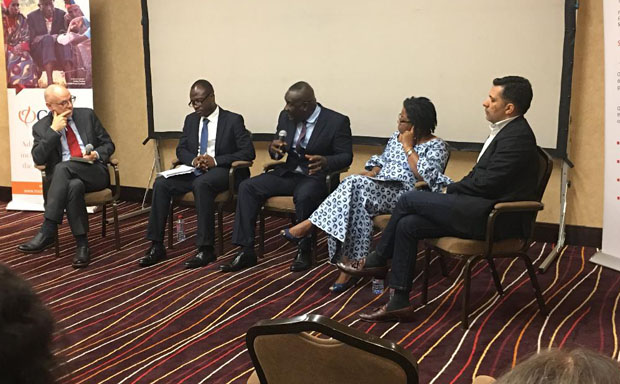Godwin Anku, a representative of the Finance Minister, Stephen Sasu-Yeboah (2nd left) and other panelists at the event
The implementation of Ghana’s financial inclusion strategy will start in September this year, Minister of Finance Ken Ofori-Atta has disclosed.
Mr Ofori-Atta, in a speech read on his behalf at the launch of Global Findex 2017 Survey on Financial Inclusion yesterday in Accra, stressed the need to sensitise all stakeholders in the ecosystem to play their respective roles in ensuring a comprehensive implementation of the strategy.
“One thing that can easily be identified in the implementation of the national Financial Inclusion and Development Strategy is that Government of Ghana is determined to harness the benefits of digitization by a developing a nationally inclusive digital payments ecosystem as a first step towards the development of a digital economy.”
He said that government is taking the lead in the process by digitizing its payments in order to bolster the effectiveness of fiscal operations, improve security of government transactions, eliminate waste and leakages through a strong transactions audit trail and elicit behavioural change among the people.
“It will also provide incentives for the use of other payment modes as a way of promoting the transition from a cash dependent economy to a cash lite one.”
The research, conducted by the World Bank Group and financed by the Bill and Melinda Gates Foundation, said many Ghanaians have opened bank and mobile money accounts since 2011.
Background
Giving a brief background of mobile money deployment in Ghana, the Minister said over 11 million Ghanaians had active mobile money accounts as at 2017 with a higher percentage increment compared to 350,000 Ghanaians in 2011.
He said Ghana, recognized as one of the successful and fastest booming mobile money markets in the sub-Saharan Africa, is currently at par with Tanzania, which was far ahead of Ghana in 2011. Kenya now enjoys the highest mobile money transactions.
People without accounts
The findings further said that about 7 million adults in Ghana do not have accounts.
Of this number, 55% are women and illiterates. Such people lacked enough money, trust in financial institutions, and have a problem with the high cost of opening an account, while others gave religious reasons.
The gender gap between adult men and women with accounts in Ghana is estimated at 8%, while that of Cote d’Ivoire is 11%.
In the case of Kenya, it’s 24% while in Tanzania and Uganda, the records remained 9% and 13% respectively.
BoG’s perspective
Stephen Sasu-Yeboah, Head of Research and Statistics Office of the Payments Systems Department, Bank of Ghana, said the Central Bank has plans to register mobile money agents and give them unique numbers to precisely identify agents.
Sub-Saharan Africa
Mobile Money transactions in the sub-region have risen from 12% to 21% and play a major role in some weak and conflict affected economies.
Global
There are over 1.7 billion unbanked adults who represent 31% of all adults, most of whom are women and the poor.
By Ebenezer Gyamerah


